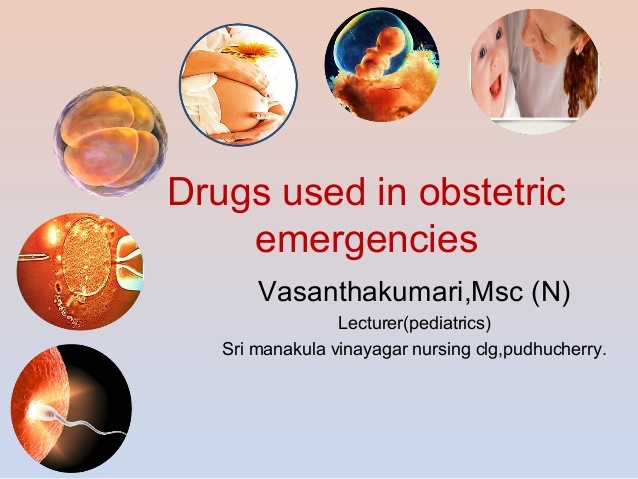
Drugs used in Obstetric Emergencies to modify Uterine Contractions
Drugs may be used to modify uterine contractions. These include oxytocic drugs to stimulate uterine contractions both in the induction of labour and to control postpartum haemorrhage and beta2-adrenoceptor agonists used to relax the uterus and prevent premature labour.
Postpartum Haemorrhage
Ergometrine and oxytocin differ in their actions on the uterus. In moderate doses oxytocin produces slow generalized contractions with full relaxation in between; ergometrine produces faster contractions superimposed on a tonic contraction.
High doses of both substances produce sustained tonic contractions. Oxytocin is now recommended for routine use in postpartum and post-abortion haemorrhage since it is more stable than ergometrine.
However, ergometrine may be used if oxytocin is not available or in emergency situations.
Drugs in Obstetric Emergencies: Premature labour
Salbutamol is a beta2-adrenoceptor agonist which relaxes the uterus and can be used to prevent premature labour in uncomplicated cases between 23 and 24 weeks of gestation. Its main purpose is to permit a delay in the delivery of at least 48 hours.
The greatest benefit is obtained by using this delay to administer corticosteroid therapy or to implement other measures known to improve perinatal health. Prolonged therapy should be avoided since the risk to the mother increase after 48 hours and the response of the myometrium is reduced.
Treatment of vaginal and vulval conditions – Anti-infective drugs
Candidal vulvitis can be treated locally with a cream but is almost invariably associated with a vaginal infection which should also be treated. Vaginal candidiasis is treated primarily with antifungal pessaries or cream inserted high into the vagina (including during menstruation) local irritation may occur on the application of vaginal antifungal products.
Imidazole drugs (clotrimazole, miconazole) are effective in short courses of 3 to 14 days according to the preparation used; single-dose preparations after an advantage when compliance is a problem. Vaginal applications may be supplemented with antifungal cream for vulvitis and to treat other superficial sites of infection.
Nystatin is a well-established treatment (but stain clothing yellow). One or two pessaries are inserted for 14 to 28 nights; they may be supplemented with cream for vulvitis and to treat other superficial sites of infection.
Drugs in Obstetric Emergencies: Trichomonal infections
Commonly involve the lower urinary tract as well as the genital system and need systemic treatment with metronidazole or tinidazole. Bacterial infections with Gram-negative organisms are particularly common in association with gynaecological operations and trauma. Metronidazole is effective against certain Gram-negative organisms, especially Bacteroides spp. and may be used prophylactically in gynaecological surgery. Metronidazole is also indicated for bacterial vaginosis.
READ ALSO
CPR in pregnant women: complications and studies
Medest – The pregnant patient management
How to provide correct emergency medical care to a pregnant woman with trauma?


